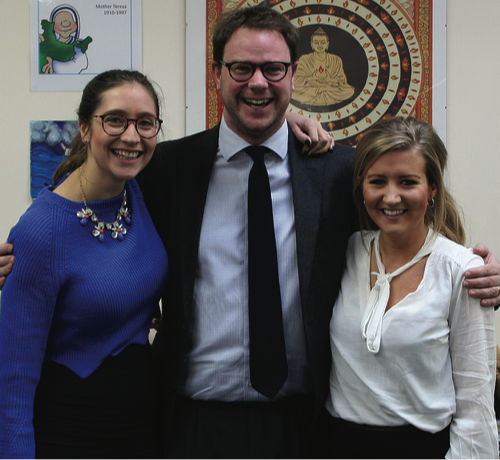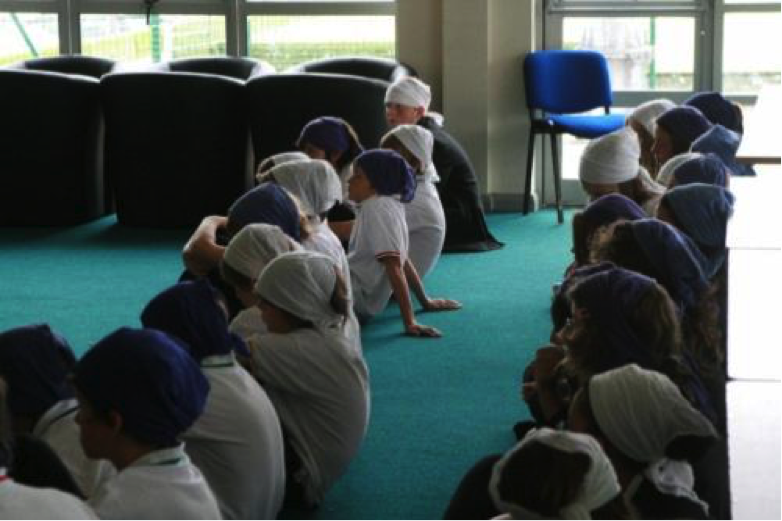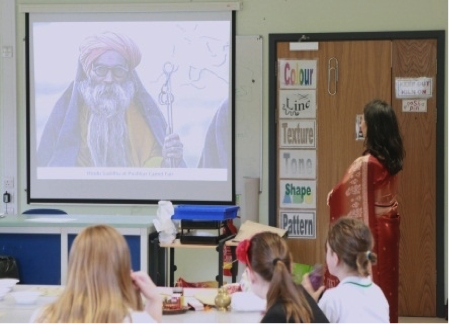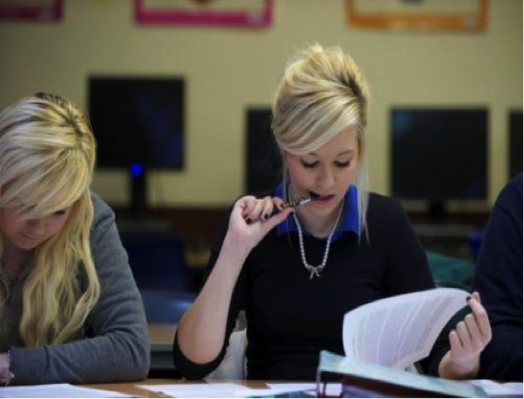Religious Education
 Curriculum intent
Curriculum intent
Our department aim is to ensure that every child is religiously literate by the time they leave us. All children will be offered a broad and detailed Religious Education curriculum covering the six major world religions, non-religious and secular ideas. They will be given the opportunity to explore their own religious, philosophical and ethical ideas and compare these to the ideas of academic scholars, sacred texts and their peers alike. By the end of year 9 pupils will be able to confidently compare and contrast the views of the various religions studied and apply these to modern philosophical and ethical issues. This will serve them well in the multicultural society we live as well as preparing them for GCSE and A Level study.
The skills our curriculum enable students to cultivate are:
- Religious literacy
- Consideration of divergent views
- Consideration of how sacred texts are used to look for answers
- Consideration of the impact of belief in the modern world
- Consideration of the influence of history and culture on religion
The Religious Education department at Balcarras ensures that everything we do is at the heart of the whole school curriculum aims by delivering high quality teaching, ensuring equal access to learning for all pupils, with high expectations for every pupil. Our curriculum is structured to ensure that promote British values are taught and, we support pupils’ spiritual, moral, social and cultural development.
Learning Journey
|
Year |
What students will learn |
|---|---|
|
Year 7 |
Christianity Who are the Christians? What is the Bible? Who was Jesus? Who were Jesus' followers? What are the core Christian beliefs? What does a Christian life look like? Philosophy and Ethics Philosophy Fortnight Does God exist? What happens when we die? Is there a meaning to life? Why is there evil in the world? Does design in the world point to a designer? What can we learn from Plato and Aristotle? Belief in action Is my town religious? How religious is my country? How have religious and non-religious people changed the world? How do religions work together? What do people believe about charity?
Key Skills Religious literacy Consideration of divergent views How sacred texts are used to look for answers The impact of belief in the modern world The influence of history and culture on religion |
|
Year 8 |
Hinduism What is Hinduism? Gods and goddesses Karma and reincarnation Puja Shrines Festivals Buddhism What is Buddhism? Noble Truth 2 – The Three Poisons Noble Truth 3 – Enlightenment and Nibbana Noble Truth 4 - The Eightfold path Meditation and worship The Sangha Pilgrimage Sikhi What is Sikhi? Guru Nanak The Five K’s The Khalsa Guru Granth Sahib The Gurdwara Sikhi in Britain Khalsa Aid
Key Skills Religious literacy Consideration of divergent views How sacred texts are used to look for answers The impact of belief in the modern world The influence of history and culture on religion |
|
Year 9 |
Judaism What is Judaism? Abraham and Covenant Orthodox and Reform Judaism Holy texts Rites of passage Festivals and holy days Islam What is Islam? Muhammad and prophets The Five pillars The Mosque Women in Islam Islam in Britain Applied religion and ethics Do animals have rights? What do we believe about life after death? How did the world begin? What is equality? What is our soul? What is feminism?
Key Skills Religious literacy Consideration of divergent views How sacred texts are used to look for answers The impact of belief in the modern world The influence of history and culture on religion |
|
Year 10 |
For a full list of topic content please refer to the OCR Religious Education specification Christian beliefs Buddhist beliefs Religion, family and relationships Existence of God |
|
Year 11 |
For a full list of topic content please refer to the OCR Religious Education specification Christian practices Buddhist practices Religion, peace and war Dialogue between religious and non-religious worldviews |
|
Year 12 |
For a full list of topic content please refer to the OCR Religious Education specification Normative Ethics Ancient philosophy Arguments on observation Problem of Evil Augustine Euthanasia Soul Mind and body Business Ethics Death and the afterlife Christian Moral Principles Christian Moral Actions Religious experience Jesus Knowledge of God |
|
Year 13 |
For a full list of topic content please refer to the OCR Religious Education specification Conscience Meta Ethics Religious Language Secularism Sexual Ethics Gender Pluralism Nature of God Arguments based on reason Liberation Theology Knowledge of God |
Curriculum map Key Stage 3
|
Autumn 1 |
Autumn 2 |
Spring 1 |
Philosophy Fortnight |
Spring 2 |
Summer 1 |
Summer 2 |
|
|---|---|---|---|---|---|---|---|
|
Yr 7 |
Moral Dilemmas |
||||||
|
Yr 8 |
Why do we disagree |
||||||
|
Yr 9 |
Introduction to Philosophy and Ethics GCSE |
Curriculum map Philosophy and Ethics (GCSE and A level)
|
Autumn 1 |
Autumn 2 |
Spring 1 |
Spring 2 |
Summer 1 |
Summer 2 |
|
|---|---|---|---|---|---|---|
|
Yr 10 |
Philosophy and Ethics – Existence of God Mock exam |
|||||
|
Yr 11 |
Philosophy and Ethics – Religious Dialogue Mock exam |
Revision |
Exams |
|
12 |
Ancient philosophical influences Arguements based on observation |
|
Mock exam |
Religious experience |
||||
|---|---|---|---|---|---|---|---|---|
|
13 |
|
|
Mock exam |
Liberation Theology Arguments based on reason |
Revision |
Exams |
||
Key Stage 3
 Year 7 Religious Education focuses predominantly on Christianity, however, this is done through reference to the beliefs of the six major world religions as well as pupils own ideas.. The approach is first made through an investigation into the Philosophy behind religious belief itself. Pupils will be asked to question what God is, as well as consider their own beliefs on a number of subjects, for example miracles and life after death. Students then investigate the Bible as a source of guidance and authority for Christians and will become familiar with the life and teachings of Jesus as portrayed in the gospels. Then pupils focus on the teachings and methods of worship in the Christian Church and the role of local faith communities.
Year 7 Religious Education focuses predominantly on Christianity, however, this is done through reference to the beliefs of the six major world religions as well as pupils own ideas.. The approach is first made through an investigation into the Philosophy behind religious belief itself. Pupils will be asked to question what God is, as well as consider their own beliefs on a number of subjects, for example miracles and life after death. Students then investigate the Bible as a source of guidance and authority for Christians and will become familiar with the life and teachings of Jesus as portrayed in the gospels. Then pupils focus on the teachings and methods of worship in the Christian Church and the role of local faith communities.
Year 8 pupils will be introduced to the world religions of Buddhism, Hinduism and Sikhism. This year enables pupils to consider religion on a worldwide basis and the differences that may arise between cultures. Pupils will be asked to question what they can learn from different religious attitudes and how this compares to their beliefs and spirituality. The world faiths will be considered using the framework of the new Gloucestershire Agreed Syllabus.
Pupils in Year 9 study the world religions of Islam and Judaism. This allows them to consider the religious beliefs behind these religions and how they compare to their own. This year involves much cross-curricular work with pupils comparing these religions to work they are completing in other subjects, such as History and Science well as media portrayals. Year 9 requires pupils to work in GCSE mode, where they will be asked to consider their opinions on issues and ask fundamental questions. Pupils have found this aspect of the course to be stimulating and throughout the course their confidence at expressing themselves in both discussion and written work is noticeable.
Learning in the religious education department exhibits a wide range of valuable, desirable and sought-after personal skills and attributes. Through studying religious education pupils are able to demonstrate their ability with the skills of investigation, interpretation, reflection, evaluation, empathy, analysis, synthesis, expression, application of knowledge and discernment. These go hand in hand with open-mindedness and a sense of spirituality.
GCSE
 At GCSE we study the OCR Religious Education examination, which involves pupils studying, Philosophy and Ethics as well as Christian and Buddhist beliefs and practice. Studying Religion, Philosophy and Ethics at GCSE is both challenging and rewarding. Pupils are required to use a range of thinking skills. Pupils are required to have opinions, be able to analyse and critique as well as consider why people hold certain points of view. The course covers issues from the problem of evil and life after death to relationships and war and peace and enables pupils to mature both academically and emotionally. During this course pupils gain skills such as empathy, consideration of others, self-evaluation and literacy skills. The lesson content is varied; pupils will be asked to partake in debates and discussions as well as working independently on essays. Results are excellent and reflect quality teaching and the dedication that pupils show to the subject.
At GCSE we study the OCR Religious Education examination, which involves pupils studying, Philosophy and Ethics as well as Christian and Buddhist beliefs and practice. Studying Religion, Philosophy and Ethics at GCSE is both challenging and rewarding. Pupils are required to use a range of thinking skills. Pupils are required to have opinions, be able to analyse and critique as well as consider why people hold certain points of view. The course covers issues from the problem of evil and life after death to relationships and war and peace and enables pupils to mature both academically and emotionally. During this course pupils gain skills such as empathy, consideration of others, self-evaluation and literacy skills. The lesson content is varied; pupils will be asked to partake in debates and discussions as well as working independently on essays. Results are excellent and reflect quality teaching and the dedication that pupils show to the subject.
A Level
 During this challenging and rewarding course, students will develop their knowledge and understanding of a variety of philosophical arguments, ethical theories and theological ideas as well considering their own interpretations.
During this challenging and rewarding course, students will develop their knowledge and understanding of a variety of philosophical arguments, ethical theories and theological ideas as well considering their own interpretations.
The course covers the work of the great philosophers such as Plato, Kant, Aquinas and Descartes to more modern philosophical works. You will also be covering ethical theories and applied ethics, covering such topics as euthanasia and business ethics. As well as this students get to extend their understanding of the study of religion, particularly Christianity, considering its influence and history as well as the place that it has in today's world. During our lessons, students develop research and analytical skills, as well as logical thinking skills and the use of reasoned argument.
Trips
Pupils studying religion in the department attend conferences and pay visits to places of religious importance. The department arranges a regular multi-cultural event where representatives from the major world religions come into school to work with pupils. We also run two residential trips in association with the History and Politics departments, to Berlin in year 10 and New York for Sixth Form pupils.
'Philosophy, Ethics and Theology is a thought-provoking subject. I have learnt how to analyse and listen to other points of view.’
'Philosophy, Ethics and Theology provided a refreshing insight into thinking. The course improved my analysis and evaluation skills whilst teaching topics that could be applied in all of my other subjects.’
'It is a subject that challenges you to ask, rather than answer.'
'It is interesting to see different people’s beliefs and discuss my own.'
